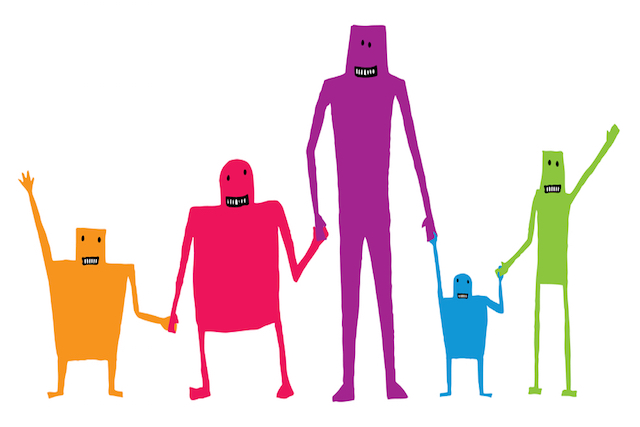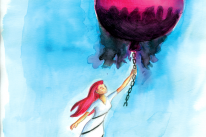
“Everyone you will ever meet knows something you don’t.” ~Bill Nye
It’s cool to be a little cynical, right? We’ve all seen the movies; we know an air of ennui and a well-cultivated sneer is all a person needs to get by.
When I was in my early twenties I used to archly describe myself as an “optimistic cynic.” To me, it sounded cool. I was playing in bands, and I’d decided this was how I wanted to show up to the world.
Back then I responded to everything, whether good or bad, exciting or not, through a filter of sarcasm. (And for those who don’t know me, I’m talking British sarcasm here too. The strongest kind.)
Thankfully, though, after years of deep work on myself, I eventually realized that really, in being so cynical, I was just hiding behind a façade, a front. The cynicism was a barrier to protect myself, and ultimately, it halted me making real connections with others, and myself.
I think I first realized this while at university. There was a guy who lived on my floor who was just a really good person.
Andy was happy, friendly, well-liked by everyone. The source of good emotions wherever he went.
At the time, of course, I dismissed his demeanor as an act to be liked, which, as I write this now, I realize was me projecting my own issues on him.
But even then a part of me knew Andy was doing something right. When he’d invite me to things (and I of course turned him down with a sarcastic aside) I felt a little silly, a little humbled by his great outlook and energy, which contrasted so greatly with my self-defeating ‘cool.’
You see, deep down I knew I wanted to do all the things he was doing. I wanted to live my honest truth like he was, but for whatever reason I couldn’t bring myself to let go and just be myself. Andy held a mirror up to my sneer, and I didn’t like what I saw.
I’m glad to say I’m not like that anymore. But it’s still in me on occasion, and I think in all of us if we aren’t careful. It seems more and more, cynicism is becoming the default setting for our collective consciousness. It’s the way to be now in this post-modern world.
Don’t trust people. Don’t show your feelings. Don’t give a damn, frankly.
We live in very uncertain times, so it’s understandable, then, that we’ve learned to question people’s motives. But where this once still bordered on liberal curiosity, it is fast turning to simple mistrust, disconnection, and in many cases, actual fear of others.
It’s a sad situation, and something I feel we all need to be aware of. More so, we need to actively fight against this cynicism and learn to connect with each other again.
A study at Harvard that was conducted over a staggering seventy-five years has proven beyond any doubt that that when it comes to being happier in every way, it’s all about making real connections:
“The more areas in your life you can make connection the better…The study’s most important finding is that the only thing that matters in life is relationships…Happiness is love. Full stop.”
But before we can make powerful connections with others, there’s someone else we need to connect with—ourselves.
When we are disconnected from ourselves, we lose our power and our confidence in our abilities; thus, our ability to trust ourselves diminishes. And if we can’t trust ourselves, how can we trust others?
So, we need to take the time to discover our own wants and desires and to connect fully with our core values. When we have this self-knowledge a lot of other things quickly fall into place.
You can practice this in small ways too. Take time throughout the day to engage in a tech-free walk in nature and get your peripatetic system working. You’ll be surprised how quickly you connect with your truth when you’re completely alone with no distractions of any kind.
Meditation, too, is a great way of just being with yourself fully. You’ll often find you have great insights once you actively create some silence for a short period and calibrate yourself. In this way, we can quickly become a person who is so focused on their path that cynicism never even gets a look in.
When we connect with the vision we have for ourselves, we gain clarity and can then relax, become more comfortable, and begin to create real connections with the world outside.
When you take the time to do this, you make peace with yourself, and it is from this position of power that you can create powerful moments with other people and become the source of good energy wherever you go.
You can start this today: Practice actively connecting with people on a deep, powerful level. Look into their eyes just that extra second longer; give a hug that has real emotion behind it, a handshake that lasts a little longer than normal, or a comment that hits just right.
With every person you talk to from now on, make a connection. Create a moment. Turn off the rest of the world and just, warmly, be with them.
Do this right and it’ll feel like you’ve made time stand still. You’ll soon realize how great you not only make others feel, but how great you feel yourself as your connection and empathy for the world grows.
Because flip back to the “cynical optimist” version of me you met at the start, and you’d see someone who regularly reacted badly to others, who got annoyed easily.
I’m sure we all have had those times when other people have riled us—the man on the street walking too slowly in front of us or too close behind us, the rude checkout girl who can’t raise a smile, the work colleague who makes bad jokes or talks too much.
We know that getting annoyed only ultimately harms ourselves. If something annoys you, that’s on you. And while we might think we’re displaying dominance and superiority by getting annoyed, really, all we’re doing is giving away our power and becoming disconnected to others and our true, better selves.
Researchers have dubbed this fundamental attribution error, which states that we tend to give too much weight to someone’s personality or disposition in explaining their behavior in a given situation.
In other words, we all too often take one single thing that someone does and use it to make a judgment on their entire persona. I’m sure you can agree that this does not help at all in creating honest connections with our fellow humans.
We need to combat this bias whenever we can. A great technique I found, that immediately helps us feel more present and connected with others, is to consciously reframe the event.
When you feel yourself getting a little antsy, rather than stewing on it and becoming disconnected and wound up, simply change the story.
That man walking too fast behind you? He’s late for his new job and is a little worried about what his new boss will say.
The sulky checkout assistant? They’ve just split up with their partner and feel heartbroken.
If someone annoys you, tell yourself a story about why they are doing what they’re doing, and reframe it in a way that you can relate to.
In this way we can all learn to be a little more empathetic, a little more connected, a little nicer even.
And like I say, living this way really is a win/win situation all round; as you grow more connected with yourself and your environment, your own power and confidence will grow as a result. So create moments, reframe the stories you tell yourself about others, and show up in the world as a source of great emotions.
That’s something we can all connect with.
About Matt Hattersley
Matt Hattersley is a writer and trainer that helps people Live Life at 100% by removing the limiting beliefs, stress and anxiety that keeps them playing small and not getting what they want. Connect with him here and download the free 7 Minute Reboot Audio that leads to more clarity & confidence.













 Though I run this site, it is not mine. It's ours. It's not about me. It's about us. Your stories and your wisdom are just as meaningful as mine.
Though I run this site, it is not mine. It's ours. It's not about me. It's about us. Your stories and your wisdom are just as meaningful as mine.
Thank you for your sharing. We need courage in order to be genuinely enthusiastic about life. 🙂 To connect with others, we need to let go of judgments and our inner critics so as to embrace people for who they are.
Thanks for the comments Lotus. You are so right. Courage, and a little of bit of risk taking even are so important to get the most out of life. We need to all put ourselves out there more and connect. Best wishes
I’ve been following several on-line magazines for quite a while that focus on alternative views, opinions, beliefs and supposedly healthier ways of living. The level of cynicism demonstrated in way too many articles is sometimes annoying, sometimes disheartening. It is certainly never uplifting. I have been focused on my own self-understanding for a very long time, partly due to growing up in a family with significant mental health issues, and partly because I have always felt driven to discover more of myself. It is more than delightful to discover another who knows how essential self-understanding is and that it must be approached with not just seriousness, but also true gentleness. Thanks for being willing to state so honestly who you once were and who have become. All of us need more people who are like this in our lives.
Very touched by these words Greg – thank you for reading and commenting. Its good to know people connect with this. Please let me know if you would like to discuss anything further. Best wishes M
Mr. Richards,
This comes in handy. You see I am very choosy in whom to sit with in my favorite coffee shop. Oh, I practically know every regular. That knowledge however has driven me off from most of them because the subjects they generally talk about don’t fall within the realm of my mental priorities.
But I wanted to connect not for a very specific reason, but just to sit with a group even momentarily. Besides I know them and they know me.
Suddenly it occurred to me that I really can. I can sit with them but not become like them, I can discuss issues with them, but not believe in them.
I suddenly realize that I can sit with them, but not marry them.